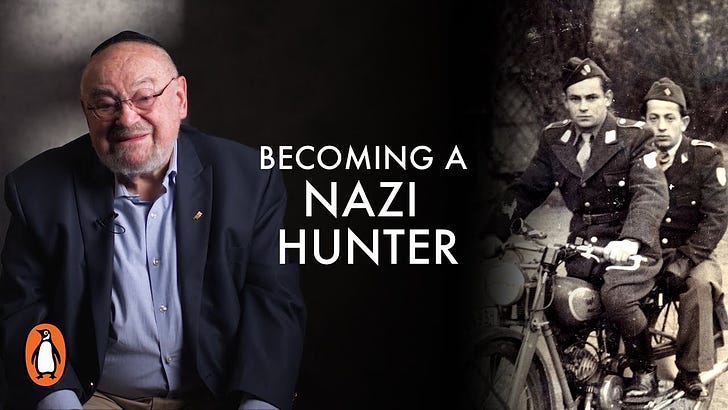The moment I decided to become a Nazi hunter.
Your daily dose of the top videos, articles, and podcasts from the wide world of Judaism and Israel ✡️ 🇮🇱
Also in today’s dispatch:
How the global Shabbat project started (video)
Bnei Menashe Jews still construct Sukkahs after being displaced (article)
Keturah’s story: From Hollywood to Israel (video)
Why the US-Israel visa waiver is a game changer (podcast)
Is lab grown pork kosher? (article)
Yosef Alon’s murder in the Yom Kippur War and the conspiracy behind it (video)
New memorial rises from the rubble of a Belarus cemetery (article)
🔝 Today’s Featured Story
At only sixteen years old, Josef Lewkowicz became a number, prisoner 85314. Following the Nazi invasion of Poland, he and his father were separated from their family and herded to the Kraków-Plaszów concentration camp. Before the war was over Josef would witness the unique horrors of six of the most notorious Nazi concentration camps, including Auschwitz, Mauthausen and Ebensee.
From salt mines to forced marches, summary executions to Amstetten, where prisoners were used as human shields in Allied bombing, Josef lived under the spectre of death for many years. When he was liberated from Ebensee at the end of the war, conditions were amongst the worst witnessed by allied forces.
With his freedom, Josef returned home to find that he was the only one left alive in an extended family of 150. He spent a year in Poland finding and saving Jewish children who’d been left by their parents in hiding.
Compelled by the need to do something further to avenge his loss, he joined the Jewish police in Austria while still in a displaced persons' camp, and was recruited as an intelligence officer for the US Army who gave him a team to search for Nazis in hiding.
Whilst rounding up SS leaders, he played a critical role in identifying and bringing to justice his greatest tormentor, the Butcher of Plaszow, Amon Göth, played by Ralph Fiennes in Schindler's List.
‘Life has a lot to offer,’ is Lewkowicz’s motto. ‘Do good, help people, teach people, tell the story that happened. It should never be forgotten.’



